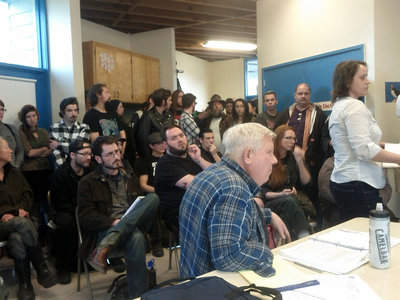
The Whiteaker Community Council (WCC) got a surprise at its annual elections meeting Wednesday, April 9, when upward of 80 residents of Eugene’s hippest district packed into the small room at the Whiteaker School to air concerns about a proposed noise ordinance.
Within minutes, the standing-room only crowd, comprised largely of neighborhood artists, musicians and small business owners, achieved its aims when WCC chair Brad Foster quickly moved to reschedule board elections for two weeks out, when everyone present at the meeting will be eligible to vote. WCC bylaws require residents attend at least one meeting in the past year in order to vote. Many of those concerned about the proposed ordinance had not attended previous meetings.
The meeting was evidence of grassroots democracy in action, as residents and board members exchanged ideas on the future of the Whit. Many in attendance expressed concern that a suggested city-wide noise ordinance, which would have to be passed by the Eugene City Council, does not have broad community support and would effectively kill the ability of clubs like Tiny Tavern and Sam Bond’s to continue to operate as venues for live music.
The grassroots effort was spearheaded in large part by musician David Nickles, author of the recent “Whiteaker Manifesto,” a document that opposes in heated rhetoric the forces of gentrification that many residents see as threatening the neighborhood’s appeal as an affordable, free-spirited arts hub. “The forces of growth will saddle us with noise ordinances, parking fees and assessments,” he writes. “We cannot stop growth, but we can have a say in what kind of growth we want to see in our neighborhood.”
Christine Anderson, who distributed fliers and created an event page on Facebook notifying residents of the April 9 meeting, said there was an immediate “tidal wave” of community interest surrounding the proposed noise ordinance. As a musician who also books and runs sound for live shows at Tiny Tavern, Anderson said she was concerned about “some blanket law” being enacted. “I would be more comfortable with any decision being made if more residents were involved,” she said.
After the meeting, Nickles said he was pleased with the large turnout as well as the WCC’s flexibility in rescheduling the elections to April 23, when as many as a dozen new board members can be elected. “There’s a sense that if we want to have a say in how our neighborhood grows and develops, we’d better get involved now before it’s too late,” he said. “By the time they break ground on the first luxury condo, it’s usually too late.”
Nickles, who continues to reach out to members of Whiteaker’s arts and business community in preparation for the election, said he’s encouraged by the increase in community awareness he’s encountered. “This isn’t about any one person’s agenda,” he said. “What really became apparent through this process was that we need broad participation from the neighborhood as a whole, and that’s what we’re working toward.”